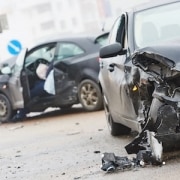What You Need to Know About Utah Texting and Driving Laws
You know texting and driving is dangerous, but taking a peek every now and then on your phone isn’t that bad, right? It’s not like it’s against the law or anything. Actually, guess again. Before you even think about reaching for your phone while driving you should know about Utah’s texting and driving laws because they will affect you. Here’s what you need to know.
In Utah, texting while driving is illegal. You cannot write, send, or read a text message while driving a car. If you do, you’re breaking the law.
In fact, using a handheld device while operating a vehicle in Utah is also illegal. Besides text messages, you cannot legally write, send, or read an instant message or an email. You cannot dial a phone number, access the internet, view or record video, or put data into your cell phone (like dialing a number).
If you are doing any of these things while driving you are running the risk of getting pulled over and getting a ticket. Just how big of a ticket? A class C misdemeanor with a maximum fine of $100. If someone else is injured, that class C misdemeanor is bumped to a class B misdemeanor.
Under Utah’s laws there are a few ways you can legally use your cell phone while driving. For example, you are free to talk on the phone while driving, you just cannot dial your phone while driving. You can also use your phone for GPS services while driving, and you are allowed to use your cell phone during a medical emergency, when you’re reporting a crime, or reporting a safety hazard.
You can also legally use your cell phone if you have a hands-free device or a phone that can connect to your car’s audio system, for example.
These laws, which went into effect in Utah in 2014, may seem strict. But the overall goal is to keep Utah drivers and those near roadways safe. Distracted driving is dangerous and can lead to serious injuries or death in the blink of an eye. Driving distracted not only puts you at risk, but everyone around you. Don’t risk hurting someone, and don’t risk getting a class C or B misdemeanor.
Remember, not all states have the same texting and driving laws, or even the same laws when it comes to using cell phones and driving. If you’re going to be out of state and tempted to use your phone while driving, make sure to look check out the laws so you know the consequences.
If you’ve been involved in an accident because another driver was distracted, make sure you have someone to fight for you. Cockayne Law can get you the support you need following an accident and will work hard to make things right. With a free consultation, you can discuss your options with the Cockayne team so you know whether you have a case and what to do next. Call Cockayne Law today.
















